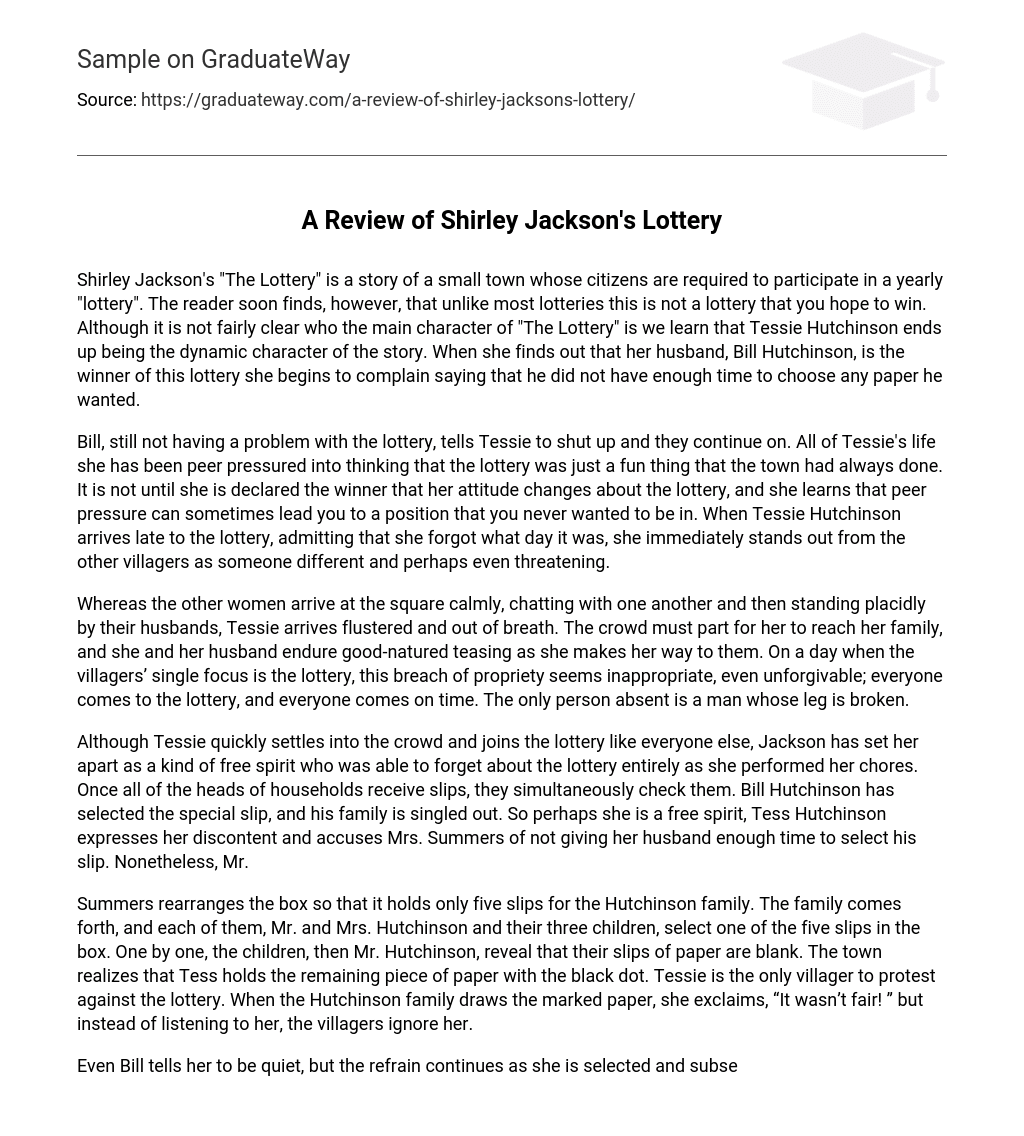Shirley Jackson’s “The Lottery” tells the tale of a small town where its residents must take part in an annual “lottery”. The unique aspect of this lottery is that it is not one they hope to win. While it is unclear who the protagonist of “The Lottery” is, Tessie Hutchinson emerges as the story’s dynamic character. Upon discovering that her husband, Bill Hutchinson, has won the lottery, she voices her dissatisfaction, claiming that he did not have sufficient time to choose any paper he desired.
Despite Bill not having a problem with the lottery, he tells Tessie to be quiet and they continue. Tessie has always been pressured by her peers to believe that the lottery was only a fun tradition of the town. However, when she is announced as the winner, her perspective on the lottery changes and she realizes that peer pressure can sometimes force you into an unwanted situation. Tessie Hutchinson’s tardiness to the lottery and her admission of forgetting the day make her stand out from the other villagers, making her appear different and possibly threatening.
Tessie stands out from the other women in the square as she arrives in a flustered and breathless state. While the rest of the women calmly chat and then stand by their husbands, Tessie must make her way through the crowd to reach her family. Her arrival elicits good-natured teasing from her husband and others. However, on a day when everyone is focused on the lottery, this breach of propriety is seen as inappropriate and unforgivable. It is expected for everyone to attend the lottery and to arrive on time, except for a man with a broken leg who is the only one missing.
Despite Tessie quickly integrating into the crowd and participating in the lottery, Jackson portrays her as a unique individual who manages to disregard the lottery completely while carrying out her chores. Once all the heads of households receive slips, they simultaneously examine them. Bill Hutchinson has drawn the special slip, and his family is singled out. Despite being a free spirit, Tess Hutchinson expresses her dissatisfaction and accuses Mrs. Summers of not allowing her husband enough time to select his slip. However, Mr.
Summers organizes the box so that it only contains five slips for the Hutchinson family. The entire family, consisting of Mr. and Mrs. Hutchinson and their three children, each chooses one slip from the five in the box. Each child and Mr. Hutchinson, one after another, reveal that their slips are blank. This makes the town realize that Tess has the remaining slip with the black dot. Tessie is the sole villager to voice her objection against the lottery. As the Hutchinson family draws the marked slip, she exclaims, “It wasn’t fair!” However, instead of paying attention to her, the villagers disregard her.
Despite Bill’s attempts to silence her, Tessie continues to protest as she is chosen and subsequently stoned to death by the entire community, including her own family. It is unknown whether Tessie would have objected to the fairness of the lottery if her family had not been selected, but this is irrelevant. Regardless of her reasons for speaking out, Tessie is effectively silenced. The villagers gather stones, with Mrs. Delacroix even struggling to carry a particularly large one. As an observer, the entire lottery process appears inherently unfair, unjust, and unimaginable.
The act of stoning to death, rooted in tradition, is not able to hide the mindless evil behind it, both within the town and elsewhere. The selection of an individual to be stoned is completely random, lacking any rational cause or justification. It remains uncertain why the villagers carry out this annual murder, and if they have any justifications for their actions. As Tess’s death looms, she understands the reader’s perspective and their natural concern for senseless violence: “It isn’t fair, it isn’t right” (Jackson 219). However, by this point, her fate has already been determined.





